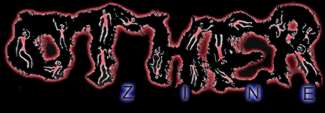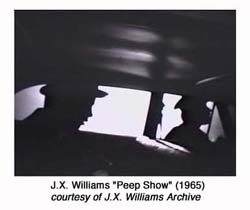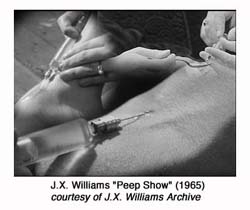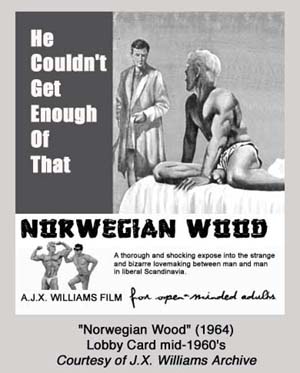
A Masterpiece At Midnight - J.X. Williams' Peep Show
by Gregory Avery
Click here for printable version
 There
is that "secret history" of the United States, the "conspiracy of lies"
that Don DeLillo wrote about and which brought about so much social turmoil,
change, and upheaval in the second half of the 20th century. But can those
times be said to be more...stylish? After all, people in the Seventies
waxed so nostalgically over the Fifties, willing to overlook such things
as H.U.A.C., Korea, the blacklisting which was a travesty of civil rights,
and the violent events that led to the start of the civil rights movement.
What people wanted to remember was a time more "innocent" than the period
they were currently living through. The same thing is happening now with
VH1's idyllic reveries on the Eighties and Seventies, in which "Star Wars"
and, Lord help us, Shields and Yarnell take precedent over anything that
happened during the Nixon and Reagan administrations (and plenty did).
There
is that "secret history" of the United States, the "conspiracy of lies"
that Don DeLillo wrote about and which brought about so much social turmoil,
change, and upheaval in the second half of the 20th century. But can those
times be said to be more...stylish? After all, people in the Seventies
waxed so nostalgically over the Fifties, willing to overlook such things
as H.U.A.C., Korea, the blacklisting which was a travesty of civil rights,
and the violent events that led to the start of the civil rights movement.
What people wanted to remember was a time more "innocent" than the period
they were currently living through. The same thing is happening now with
VH1's idyllic reveries on the Eighties and Seventies, in which "Star Wars"
and, Lord help us, Shields and Yarnell take precedent over anything that
happened during the Nixon and Reagan administrations (and plenty did).
The flagrant wrongdoing of today looks uncouth compared to the picture J.X. Williams presents us in "Peep Show"---at least they had cool fedoras, then, while going about their thuggery. With the starkness of a Weegee photograph or a vintage Signet paperback cover for a Mickey Spillane thriller, Williams, who at one time had connections that led to both the Chicago crime syndicate and J. Edgar Hoover, provides us with a nightmare tour of a period in 1961 involving Sam Giancana, the newly-elected John F. Kennedy, the Cuban revolution which displaced the mob's lucrative hotel and casino interests, the rising traffic in illegal narcotics, and Frank Sinatra, familiar with both Giancana and Kennedy (as was Judith Exner, who earns only scant mention in Williams' film, but hers is another story). Sinatra made some bizarre career choices during the Sixties---some terrible movies with Dino and Sammy, recording "Somethin' Stupid" with daughter Nancy---and even retired from concert performing for a time. "Peep Show", shockingly, shows us why.
 It has
been alleged that the distribution of narcotics in U.S. urban neighborhoods
was an attempt to scotch the rising African-American radical movement
in the 1960s. In "Peep Show", Williams shows us that this strategy was
nothing new, that select people were kept "on the needle" to serve the
interests of many dark masters (at least until second-thoughts set in,
causing a resultant concatenation of double-dealing, and double-crossing,
that reached inhuman proportions). That, plus the use of secretly made
motion pictures (thus the title "Peep Show"), of which some mind-blowing
examples are made available for our parvenu. (Apparently, hard-core sexual
activity was not invented by Marilyn Chambers and the Mitchell brothers.)
But, what does Williams want to show or say with all this?
It has
been alleged that the distribution of narcotics in U.S. urban neighborhoods
was an attempt to scotch the rising African-American radical movement
in the 1960s. In "Peep Show", Williams shows us that this strategy was
nothing new, that select people were kept "on the needle" to serve the
interests of many dark masters (at least until second-thoughts set in,
causing a resultant concatenation of double-dealing, and double-crossing,
that reached inhuman proportions). That, plus the use of secretly made
motion pictures (thus the title "Peep Show"), of which some mind-blowing
examples are made available for our parvenu. (Apparently, hard-core sexual
activity was not invented by Marilyn Chambers and the Mitchell brothers.)
But, what does Williams want to show or say with all this?
Williams made the film at a time when he had exiled himself---for reasons made apparent in the film---to Denmark, the country that would give us Essy Persson and "I, a Woman", and became, for a time, the perceived sex capitol of the world. Does Williams, perhaps, just like to watch? (Not that I would blame him---the events in "Peep Show" show that there was plenty to look at.) Not much is known about J.X. Williams---he's not even listed in Ephraim Katz's "Film Encyclopedia", which makes him really obscure, and a sprint through Internet search engines doesn't turn up anything, either. (This at a time when information about such people as Joel M. Reed is readily available.) "Peep Show" has a dark, sleek, seductive look, like polish obsidian---a dark magnificence that emerges in its revelation of an unspeakable construct of extortion, drugs, and the leveraging of influence in the highest (and lowest) of places---making one wonder if Williams is a filmmaker-"maudit" on the order of Edgar G. Ulmer, who spent years toiling and applying his considerable craft to B-movies like "Strange Illusion" and "Carnegie Hall". Yet, Williams seems to have chosen to make raunch like "The Velvet Trap" (whose leading lady has been, and sometimes still is, mistaken for, of all people, Revlon model-turned-actress Suzy Parker) and "Norwegian Wood" (which, I have heard, is somewhat prized among connoisseurs of early gay porn, alongside other winners like "The Stud Farm").
 I
would have to conclude that, on one level, Williams may be pandering to
our salacious interests with "Peep Show", but perhaps to achieve another
objective, to show that what we may not want to remember about earlier
times never entirely goes away just because we want to forget it. These
are our collective sins, which we are doomed to repeat unless we learn
our lesson from them. Today, our country had been plundered, and the standard
of living for our children, and our children's children, has been squandered
away; investigators are asking for more and more surveillance powers,
and legislators may make it legal for people to be held without bond or
recourse to council, and to be tried in secret courts. It is the sort
of wholesale corruption which would make even Sam Giancana wince.
I
would have to conclude that, on one level, Williams may be pandering to
our salacious interests with "Peep Show", but perhaps to achieve another
objective, to show that what we may not want to remember about earlier
times never entirely goes away just because we want to forget it. These
are our collective sins, which we are doomed to repeat unless we learn
our lesson from them. Today, our country had been plundered, and the standard
of living for our children, and our children's children, has been squandered
away; investigators are asking for more and more surveillance powers,
and legislators may make it legal for people to be held without bond or
recourse to council, and to be tried in secret courts. It is the sort
of wholesale corruption which would make even Sam Giancana wince.